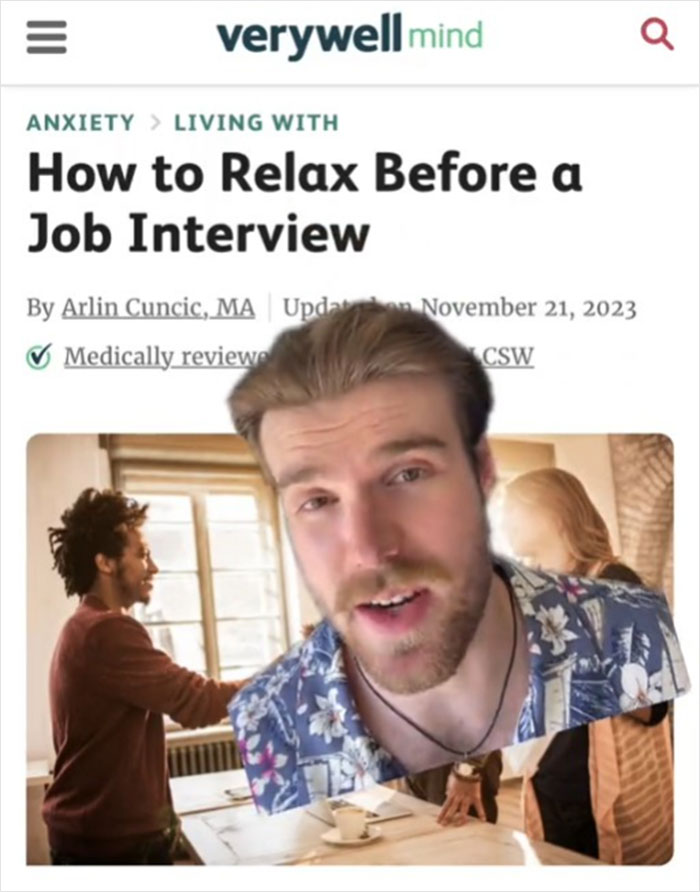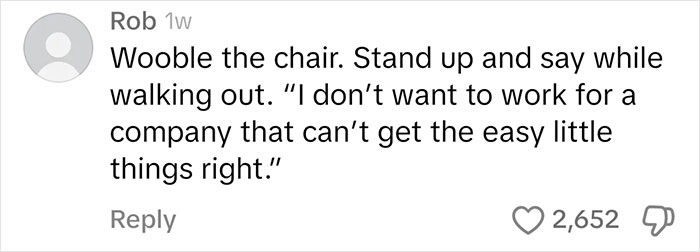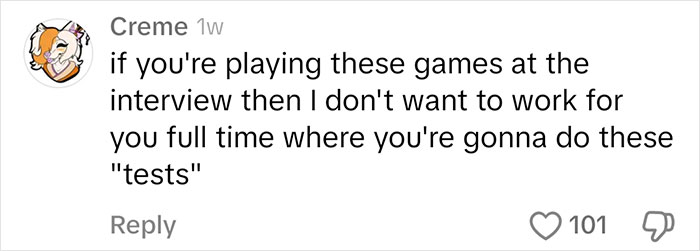A TikTok account shared a story of a person who went to a job interview, only to go through a bizarre “test” involving a purposefully damaged chair. We got in touch with ex-counterterrorism professional turned career coach Ashley Stahl to learn more about red flags to look out for when going in for a new job.More info: TikTok | Ashley Stahl
Job interviews are already stressful
Share icon Image credits: cottonbro studio / pexels (not the actual photo)
But one account shared a story of a new, secret “test” one manager tried
“A boss uses what he calls a ‘wobbly chair test’ in every interview and avoids hiring job candidates that fail. Job interviews are already stressful enough without bosses throwing in extra things that are unrelated to the job in order to test you. A reader of the Mirror shared the story that he heard from his brother, who is in ROTC in college. Applicants for the ROTC Nuclear Power school would sit in a chair in front of the desk of the interviewer. There was also a separate chair off to the side that was available for the applicant if they asked for it.” Share icon Image credits: yourtango “The chair the applicants would sit in had one leg cut shorter than the other so that it would wobble during the interview. The test was to see that if the applicant would be bold enough to stop the interview and ask for the other chair, and candidates who just toughed out the interview with the wobbly chair wouldn’t pass. Are little tests like this seriously fair to job applicants? If it was reversed, he could have just as easily said something like, ‘Oh, we’re looking for candidates who are willing to tough it out through uncomfortable situations’ and only pass the applicants who don’t ask for a new chair. So there’s really no winning.” Share icon Image credits: Tima Miroshnichenko / pexels (not the actual photo) “Interview anxiety is a real thing, and many people suffer from it. There’s a lot of pressure riding on every interview, especially in this tough job market. Verywell Mind suggested removing stresses around an interview to help alleviate interview anxiety. Isn’t a stupid wobbly chair test, just another stressor added to an already high-stakes interview?” Share icon Image credits: yourtango “It almost feels like this boss is just purposefully playing with the emotions of the job candidates. Skills, experience, and an overall culture fit are what qualifies somebody for a job, not their ability to ask for a different chair. What do you think is this wobbly chair test a fair assessment of somebody’s ability to be bold and speak up?”
You can watch the full video here
There can already be warning signs in job listings
Bored Panda got in touch with counterterrorism professional turned career coach Ashley Stahl to talk about red flags in job postings, things to keep a lookout for in interviews and some of her personal experiences. First and foremost, we wanted to know her thoughts on things to be wary of in job postings. “More descriptive job postings are generally better than vague or ambiguous ones. That doesn’t mean it has to be long; it just needs to be precise. Here are some red flags: Job responsibilities are unclear or contradictory. If the job posting cannot describe actual duties, this can be a sign that the position is a “catch-all” for many things. Also, watch for postings that tend to contradict themselves. For example, hiring an entry-level position that requires extensive training or experience in a particular area.” She also had some other suggestions for things to look out for. “Contains ambiguous language regarding pay. Most states have transparency laws regarding salary. Trigger words include earning potential, unlimited potential, or other words that indicate there’s no cap on how much you can earn. Some positions rely on commissions. Ask the hiring team how many employees currently receive commissions and what metrics are used to determine commissions and commission schedules. Any potential employer should be able to give you a concrete number or concrete range of how much money you will earn.” “The Fair Labor Standards Act (FLSA) requires employers to pay for mandatory on-the-job training. However, there are some exceptions, such as voluntary attendance, training events outside of regular working hours, training not tied specifically to the job, or the employee does not perform any productive work during the event. Nonetheless, if the job requires extended periods of unpaid training, the employer might be looking for free labor.” Share icon Image credits: Vlada Karpovich / pexels (not the actual photo)
Interviews are a great place to try and understand what an organization is like
We also wanted to know what things to consider asking during a job interview. “Here are three great questions to ask: What does success look like in this position? This question gets to the heart of how success is measured by the company. It also gives you a chance to sell yourself for the position based on the hiring manager’s definition of a successful candidate.” “How has this position become available? The response to this question can clue you into how well you will be received by your coworkers. It can also tell you whether you’re likely to be overworked or bored. Finally, the response can also let you know whether the company promotes from within.” “What do you like most about working for this company? Let the interviewer reflect on why the company is a great place to work. Listen carefully to the response to learn more about company culture, camaraderie, opportunities, and workload. If the answer is succinct, that’s a telling sign the company may not have the best culture.” Share icon Image credits: cottonbro studio / pexels (not the actual photo)
These suggestions come from real stories
We were also curious to hear if she had any personal experiences “One of my clients was hired to work in a medical spa performing lymphatic drainage using specialized equipment. When she was hired, she was told she would get training on how to use the equipment. The training was initially scheduled for six shifts totaling just under 20 hours. The training spanned two weeks. Toward the end of the second week, she asked when the pay period ended and whether direct deposit was available. She was told that the training was unpaid. She then asked how long the training period was, to which she was told, “When I think you’re fully trained.” She walked out,” she shared. “The best way to ward off unscrupulous employers is to do your homework before applying for the position. Look for company reviews. Read through their website, LinkedIn page, and social platforms. Reach out to your network to find someone who is working for the company or has worked for the company. And remember, if the job sounds too good to be true, it’s probably bogus.” You can find more of her work on YouTube, or in her book and podcast. Share icon Image credits: cottonbro studio / pexels (not the actual photo)
Viewers shared their thoughts
Share icon Share icon Share icon Share icon Share icon Share icon Share icon Share icon Share icon Share icon Share icon Share icon Share icon Share icon Share icon Share icon Share icon Share icon Share icon Share icon Anyone can write on Bored Panda. Start writing! Follow Bored Panda on Google News! Follow us on Flipboard.com/@boredpanda!


























